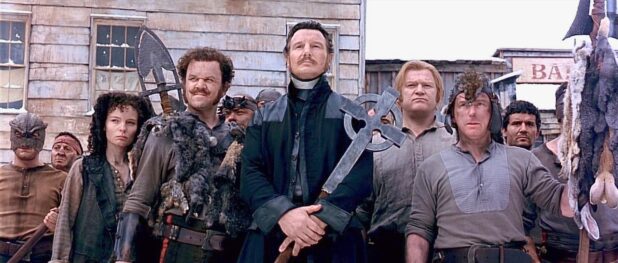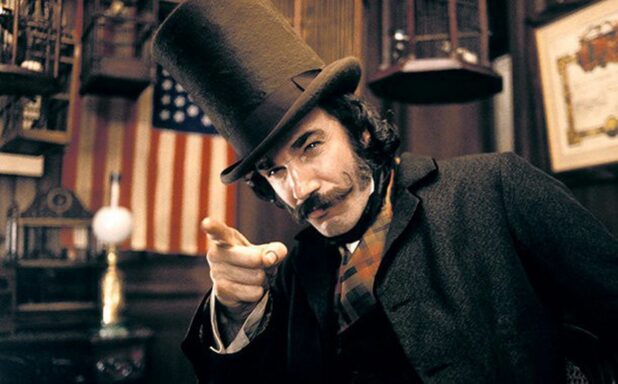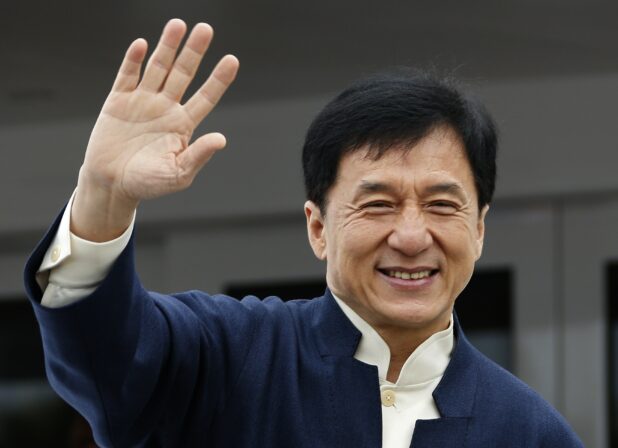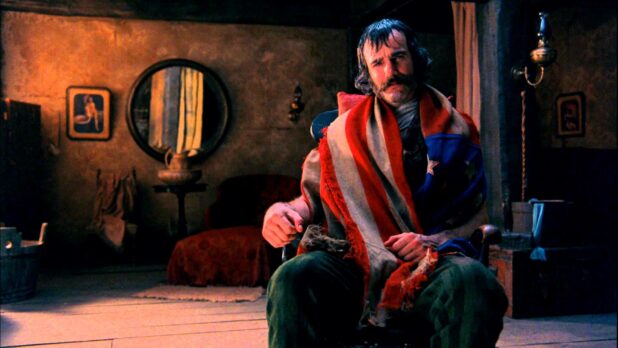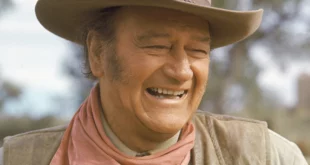If you’re getting bored with Irish identity themes, please stand by. It’s almost over. It will come back, but right now, it’s almost over. Next week, we’re starting fresh with hot new themes and edgier jokes than ever before. We need to continue on with general self-discovery, instead of my own personal self-discovery journey.
I had a revelation of Irish identity while watching Martin Scorsese’s The Departed. This was one of the only Scorsese films I hadn’t seen, and it seemed to have been waiting there for me.
I had seen Gangs of New York several times. Even when it first came out, when I was a teenager, long before I was any kind of racist, Bill the Butcher was the sympathetic character of the film to me.
I think about my work all the time, and putting the film on, I was thinking “I’m gonna title this review ‘Irish Identity on Steroids.'” I suspected that I would have serious sympathy for the Irish in the film, in light of my Irish identity revelations. This did not occur. Bill is still right.
The film opens with a flashback, showing kinsman Liam Neeson as a priest, praying for the guidance of Saint Michael the Archangel. That was very emotional for me.
But the actual story told in the film is not really about the Irish. That may sound counterintuitive, but it’s not. It’s a film about tribalism and tribal identity, and tribal conflict.
Here’s the thing I thought: this exact same story could have been told in Shanghai, with Bill the Butcher as a Chinaman and the Irish as Korean immigrants. Nothing about the story would have changed. Korea is effectively to China what the Irish are to the British (and through the transitive property, Americans). Actually, that was the funnest part of watching the film: thinking how this was showing something that could apply to other places.
Bill doesn’t actually hate the Irish as individuals, he hates them as a group that is flooding his country. He befriends many Irish, and refers to his Irish gang members as “former Irishmen,” meaning he believes they can become Americans. He is also obsessed with Liam Neeson, who he kills in the opening, as “the last honorable man,” and despite his protestantism, he keeps an icon of him with a candle burning.
But Bill is right. I don’t think that’s debatable. The Irish should have adapted, and even with Irish identity, my resentment towards the East Coast Irish who hate America has not lessened in any way. Jack Kennedy was an American. He loved America. His character was defined by his Irishness, but he was fully American. Bill might have resented Kennedy’s “Roman Popery,” but he would have respected him.
The Irish themselves are mixed between various groups. I’m sure there was a lot of mixing in Ireland, but the name “Anglin” is Norman. There’s some statue or lake or something in France with this name. So this mixing of identities and forming of new identities is just something that happens. Germany, Russia, France – they are all identities that are the result of mixing of identities, and that’s how America should be viewed. I know some Germans still identify with “Bavarian identity” because they’re Celts and not Prussian or whatever. But ultimately, previous identities wash away, and the new identity is embraced. This is called “ethnogenesis,” and it is something that America was finishing up with when the Jews opened our borders and created a fiasco.
The paternal relationship that Bill develops with Leo (whatever that character’s name is), after Bill has killed his father, is interesting, but I don’t think it has anything to do with Irishness. Leo regrets saving Bill’s life by killing one of his own kinfolk, but he’s also developed a relationship with Bill where he wants to protect him (even though the entire premise is that he’s getting close to him so he can kill him). But again, if you switched the setting to China, with Korean immigrants, nothing would change about that relationship dynamic. (I think even during this same time period, mid-19th century, there was a wave of Korean emigrants into Shanghai. But don’t quote me on that. There was definitely large-scale North Korean immigration after the war, which caused all kinds of problems.)
In The Departed, you couldn’t switch out the races. Only Irish people act like that.
In Gangs, there are a few bits of commentary on the way the Irish fight with each other while they’re fighting everyone else, but then will also sometimes help their kinfolk against outsiders, even when the two are enemies. The Irish cop is more hateful towards the Irish than Bill is. Then there is some Catholic stuff. But these are just little side things. The entire main plot could be China-Korea.
There are good racist themes in the film. It’s obvious that Bill recognizes the Irish as white men, and wouldn’t be trying to Americanize blacks or Asians. Bill and all of the gangs are also totally opposed to the war with the South, viewing it as a waste of men and money, which is interesting. Given the way that history framed it as “World War Slavery,” I think people don’t really understand how much urban Northerners opposed the war. The slavery thing is post-hoc, but at the time, Lincoln was talking about how bad it would be if the South seceded, and people in New York and Boston were like “who gives a shit if they secede, I don’t even know where the South is. I gather it is somewhere to the south of us, but this doesn’t have anything to do with me. If they want to secede, then let them.” Meanwhile, to the average Southerner, the question was existential.
The climax of the film involves that faggot Lincoln’s draft, and the city rising up against the rich, telling them to go fight their own war. It could be seen as a bit too much, but I think it was done in a clean way. The single worst thing in the film was the GCI elephant that was released from Barnum’s Museum during the riots. Like, bro. This movie cost $100 million. Get a real elephant to run across the set.
There’s a whole lot of good stuff in the film.
There are also some “New York” themes I didn’t really care about, because I’m not from New York and I’ve never had much interest in the cesspit. The film came out not long after 911, so it even has a WTC tribute thing at the end, which I thought was decadent and gross. “The violence of the birth of a nation” is an interesting theme, as no nation in history has been born out of anything other than mass death.
I think it is generally assumed that Scorsese meant to portray Bill as the bad guy and the Irish as the good guys, but I did not pick up on that at all. There is a protagonist-antagonist relationship, which is simply the way a story has to be told, and which I guess people are trained to recognize as always being the good guy-bad guy dynamic, but Bill is a very sympathetic antagonist. He’s doing what he thinks is right, trying to protect what he cares about. That’s why he has so much affection for the priest, Leo’s father – he recognizes him as having been the same man as he.
It’s a very good film. Even though I didn’t find any particularly relevant Irish themes there, I think as a piece of art, it’s better than The Departed. In particular, the script is much cleaner. Both films were made around the same time, when Scorsese was a very mature filmmaker, so I think in terms of technique, there is not really much difference. They are both done very well.
What I will say about Gangs is that the violence looks horrible. We think of most Scorsese films as being violent, but it is usually just “all of a sudden someone gets shot.” That’s violence, but it’s not “action.” Gangs had actual action scenes, I think much more than any other Scorsese film, and they were not done well. The opening scene, showing the brawl between the Americans and the Irish was shockingly bad. It wasn’t choreographed or filmed correctly. If he was doing something he didn’t know how to do, Scorsese should have brought in some team of Hong Kongese to help. Seriously, call Jackie Chan. He’ll help you, he’s a very friendly person who just likes to help others, and he’s the single best fight choreographer who ever lived (please don’t think I’m talking about his American films, which are not good).
Daniel Day-Lewis is incredible in this film, by the way. It’s one of the most compelling characters of all cinema. I have argued that it is un-American to dislike Leo, but I don’t like him playing potato face (he’s not Irish, he’s German with an Italian paternal grandfather), and I don’t think he was really equipped to stand next to Lewis, who towered over everything. Of course, that was sort of the point, that Bill was a figure who towered over everyone.
Great film, but nothing important about the Irish that I found. It’s tribal themes, and Bill the Butcher is right.
If there is any personal revelation about my Irishness here, it’s that I recognized Bill as the good guy when I watched the film as a teen, even though I didn’t have the philosophical background on that. The Irish are very clannish and tribal, so if an Irishman watches the film with no context, maybe he will side with the Irish characters. However, if an Irishman like myself who was never actually conscious of the Irish thing watches the film, then the inborn clannishness and tribalism is going to cause you to side with Bill.
I keep giving the Chinese-Korean example, but the truth is, the story could have taken place in Northern Ireland in the precise reverse, with Bill as a Catholic Irishman befriending the son of a Protestant preacher he’d killed.
 Daily Stormer The Most Censored Publication in History
Daily Stormer The Most Censored Publication in History

